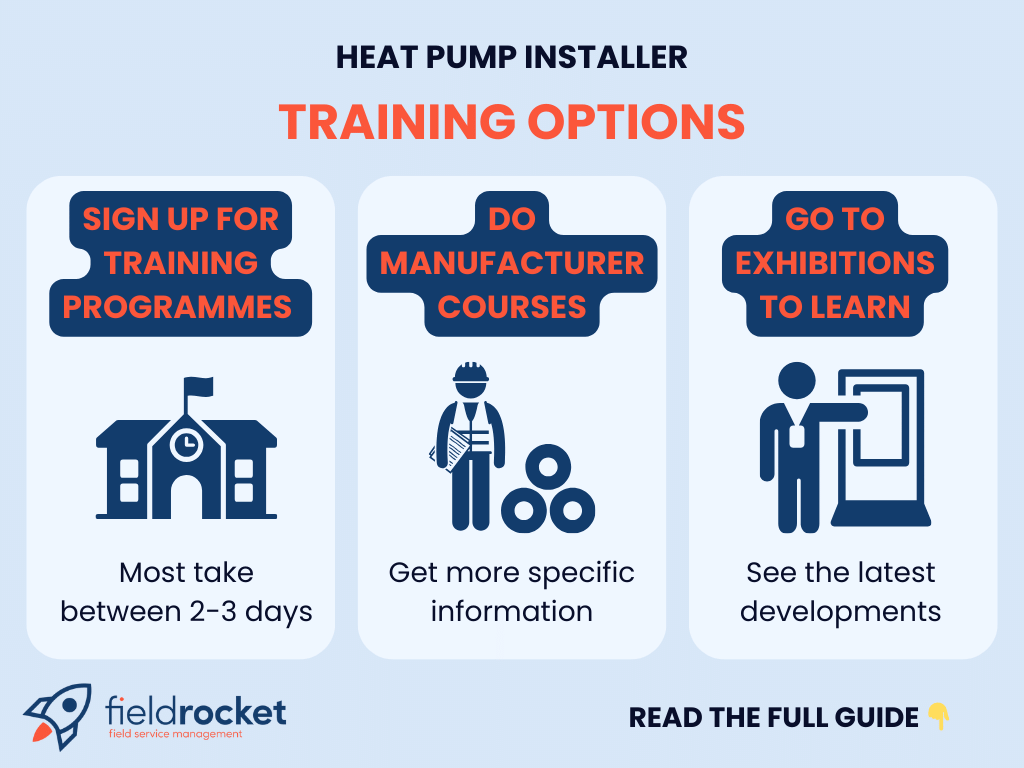Why Is There So Much Heat Pump Scepticism?
![[Featured Image] Mark Krull podcast (1)](https://fieldrocket.com/wp-content/uploads/2024/04/Featured-Image-Mark-Krull-podcast-1.png)
Any installer will agree that newer, more energy efficient and sustainable heating solutions are a good thing. But not everyone agrees that heat pumps are the solution.
Without the smoothest of introductions and reservations about their viability, there’s a good deal of scepticism about heat pumps and the future of gas engineers here in the UK. What does the industry have in store for the 140,000+ Gas Safe Registered engineers, and how do we navigate the push for heat pumps in a way that benefits engineers, economy, environment, and homeowners all at the same time?
To find out more, we invited Mark Krull from Logic4Training to get his thoughts on the future of the heating industry. Here’s what we learnt.
The future for UK gas installers
The heating industry has never been an easy one to predict: “I was sure that heat pumps were going to take off some years ago because everything was in place, a lot of R&D, and installers were getting retrained”, explains Mark.
In the past few years especially, heat pumps have been a heated topic of debate. Everyone appreciates a greener solution, but we’ve got one side pushing for widespread adoption and the other suggesting they’re not fit for the job. “It made everyone sceptical. It made the manufacturers sceptical because they put a lot of investment in it, and it made the installers sceptical because they’d gone out and done the training and maybe become MCS registered”, says Mark.
But with heat pump technology improving, what does the future hold for gas installers?
For one, Mark firmly believes that the roller coaster ride of demand for renewables and heat pumps is over: “We’ve reached a tipping point now and the resources and infrastructure behind it is such that it will keep growing”.
But that doesn’t mean there won’t be work for gas engineers in the coming years. “There are still, on a rolling 12-month average, about 1.5 million boilers being installed every year. That isn’t going to change overnight”, he says. All of these boilers will still need servicing and, when they come to be decommissioned, will require a Gas Safe registered engineer to come and take it away.
We’re entering a period of transition
If one thing’s for certain, it’s that the push for more energy efficient heating options is here to stay. Present day heat pumps are not perfectly suited to all properties – that much is clear. But heat pump technology is only going to improve provided that there’s enough support and money put into R&D: “Prices will come down, there will be new ways of tackling issues, and manufacturers are going to develop new products and solutions to meet the problems we’re facing now”.
A gradual transition is also arguably the best way to move forward. “Why would you want to close down all the UK gas boiler manufacturers and give it to heat pump manufacturers which are often based abroad?…You want a transition and you want those manufacturers to be able to build something that is specifically for the UK”, he says. “We want UK solutions to UK problems”, he adds, noting the space restrictions and other unique aspects of heating in UK homes.
“Why would you want to close down all the UK gas boiler manufacturers and give it to heat pump manufacturers which are often based abroad?
You want a transition and you want those manufacturers to be able to build something that is specifically for the UK”
– Mark Krull, Logic4Training
Providing customers with the option
The government’s push for 600,000 heat pump installations per year has definitely put pressure on manufacturers and installers alike. But in Mark’s view, UK boiler manufacturers and installers are the biggest allies (and key drivers) of this change.
“There’s going to be gas boilers out there that in 5 years time will fail and need to be repaired or replaced. I think it will become the norm then for every installer to give the house owner the options”, he explains.
For most customers, they’re not buying a boiler or heat pump, but rather a warm home and hot water. They simply want a cost-effective solution that just works.
This is where some would argue heat pumps fail to meet the mark. But this transition isn’t about pushing the adoption of heat pumps, it’s about providing customers with the option.
“There are some issues with properties, they are primarily around the insulation and energy efficiency levels of the property. That doesn’t mean a heat pump can’t be installed, but you would need an installer to go in and do a proper heat loss calculation for the property.”
Mark’s quick test for customers to tell whether a heat pump would work in their home:
Set your boiler’s radiator temperature to 50°C, open up all the TRVs and radiator valves to max (or the thermostat), and leave it for 24 hours.
If a gas boiler set to just 50°C can keep them warm enough during this time, a heat pump is viable.
Weighing up and even quoting for the two options is one of the best ways to show your knowledge and experience. Even if they choose to go with a boiler over a heat pump, they’re much more likely to work with an installer that explained the pros and cons of each route rather than one that simply disregarded the idea of a heat pump.
For Mark, providing this option is everything. More heat pump installations means more incentive for manufacturers to develop better solutions. And as the technology improves, installers will find themselves part of this natural transition that strengthens, rather than threatens, their livelihood.
So when should you get on board with heat pump training?
The short answer? As soon as possible.
Heat pumps are gaining momentum and it’s a huge plus to be ahead of the curve: “I would recommend every installer learns about it, and preferably gets trained”.
How, you might ask?
You can access our full guide here, but here’s the lowdown:
- Sign up for training courses. For qualified boiler installers, these courses take only a few days and cost practically nothing with £500 Government subsidies.
- Go to your favourite manufacturer and do their training. This way, you’ll learn about specific pieces of kit and get knowledge that a generic training provider can’t offer.
- Go to exhibitions and learn about all the new developments. See all the manufacturers, the equipment, and ask questions.
It’s also good to note that the MCS is being redeveloped to be more friendly for smaller businesses and even sole traders.
All in all, doing it now means you can start the conversation and learn in your own time. You’ll be able to get used to quoting, designing, talking to customers, and maybe even doing an install. We’ve even got some free heat pump servicing / commissioning sheet templates you can download for free.
Those that really want to invest in the future could even look at practising a heat pump installation in their own home. When your customers ask, you can then say “Yeah they work. I’ve got one in my own house”.
“The best people to deliver the heat pump change we need are gas installers. People that have been in [customer’s] houses already, that have got that relationship with them”, says Mark. “They are the best people to start that conversation and supply that option to the consumer”.
How we can help
If the goal of this transition is to provide an option, proper quoting and job management tools are essential. Our software can help quickly put together quotes and give you the chance to provide customers with the information they need to make an informed decision between a boiler and a heat pump.
But it goes further than that. Within the FieldRocket app, you can quickly and easily create all the certificates you’d ever need in your business. If you run a heating and plumbing business, all the gas certificates like your safety records and warning notices are there – but also newly-added heat pump records to make this whole transition trouble-free.
Our software is designed to help you and your team save hours each week, giving you time to think about the services your business offers, signing up for heat pump courses, and strategising for the future. See how it works in a free trial – no credit card required.
Watch the full podcast with Mark:
Next steps:
If you’ve been thinking about implementing software into your workflow to save time, here’s what you can do next:
- Visit our resources centre where you'll find more articles like this one and a full list of our certificates.
- Start a free trial to see exactly how our software works for your business.
- Book a demo with our customer success team. We’ll help walk you through the ins and outs of our software, how it’ll help you save time and money, and anything else that springs to mind.
- Know someone still using paper? Help them and us out by sending our software their way!



